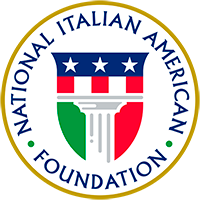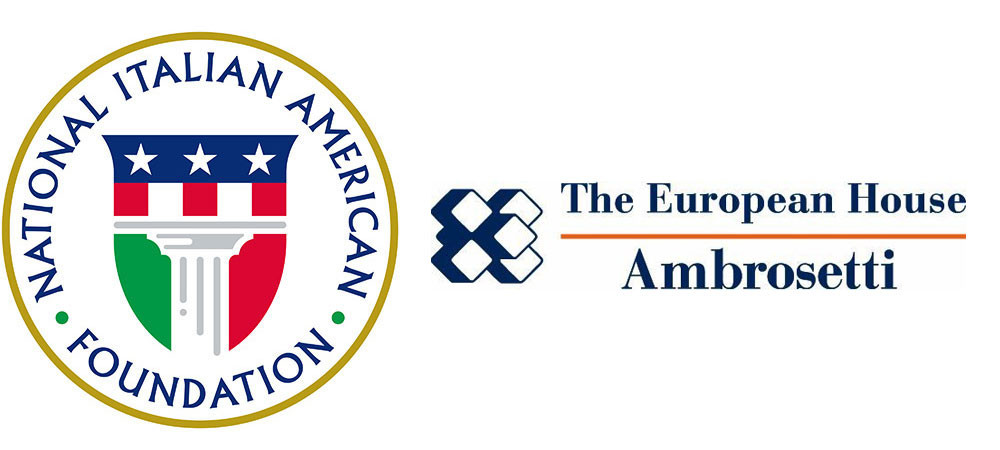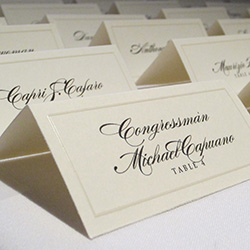
- About
-
NIAF Leadership
NIAF Board Officers
NIAF Board of Directors
NIAF Staff
Regional Leadership
- Join
- Events
- Programs
- Partnerships
- Culture
- Support
- News & Media
CLOSE- About
- Join
- Travel
- Events
- Programs
- Partnerships
- Culture
- Support
- News & Media
- Shop
- Join NIAF Today (OLD PAGE)
- Contact Us
The Strategic Relations Between Italy and the United States Past, Present and Future of an Alliance Offering Mutual Benefits
This position paper, presented during the “Intelligence on the World, Europe and Italy” Forum held in Cernobbio, was prepared by The European House – Ambrosetti, in collaboration with the National Italian American Foundation (NIAF). With the contribution of members of government and institutions and experts, the paper analyzes the strategic relationship between the United States and Italy, and identifies the prospects for how this relationship—thanks to industrial complementarity and shared geopolitical values—could be further strengthened in this time of changing global scenarios. Michael R. Pompeo, U.S. Secretary of State from 2018 to 2021, was also one of the study’s commentators.
Cernobbio, September 2, 2022.
The Position Paper “The Strategic Relations Between Italy and The United States. Past, Present and Future of an Alliance Offering Mutual Benefits” will be presented during today’s “Country Focus USA” panel. The panelists are Michael R. Pompeo (70th U.S. Secretary of State), Lindsey Graham (U.S. Senator from South Carolina), and Kathleen Kennedy Townsend (Chair of the Robert Kennedy Memorial and former LT Governor of Maryland). Maurizio Molinari (Editor in Chief, La Repubblica) will moderate the panel.
The strategic relationship between Italy and the United States has profound roots that reach back into history. Their initial interaction began in the 18th century, before the Unification of Italy. On one hand, Italy contributed to forging the cultural identity of the United States and Italian-Americans are still, today, the fourth-largest ethnic group of European origin. On the other, the United States was one of the leading lights in Italy’s rebirth during reconstruction in the post-World War II period, where Italy played a strategic role as a “pillar of the West” thanks to its position as an access point to Africa and influence in the Balkans.
Today, the United States is Italy’s no. 3 trade partner and the biggest outside Europe with a positive trade balance in the latter’s favor, worth $39.3 billion in 2021, and a constant growth curve over the last thirty years. Similarly, Italy is the no. 14 trade partner of the United States worldwide and no. 2 on a European level, second only to Germany.
Statistics regarding foreign direct investment also cohere with this. In 2020, investments stock worth $38 billion flowed into the United States from Italy, compared with $31 billion in American investments in Italy, with further margins for development given that Italy, with its expertise and technologies, could be one of the US’ key partners in the areas of sustainability and the green transition (Italy is ranked sixth in the world in terms of renewable technologies exports), and Americans could play a supporting role in the 4.0 transition of Italian manufacturing companies.
Another area of strategic cooperation is the defense industry. The United States has always been the no. 1 country in the world in terms of defense system expenditure. Italy also contributes to this expenditure through its national champions, Leonardo (twelfth-largest defense company in the world and no. 1 in Europe) and Fincantieri (no. 1 in Europe in shipbuilding and sixth in the world in terms of size). At over €760 million, the United States is also the no. 2 country for Italian defense industry exports, which in 2021 reached a level of €4.7 billion. This solid trade partnership is also reflected in a number of existing procurement programs between the two countries, such as the C130J and C127J (transport aircraft) and TH37-A helicopters—all Italian-made—and the KC-767 tankers (American-made air refueling aircraft). Finally, Italy was the first nation in the European Union to purchase the new-generation American F-35 Fighter (also recently chosen by Germany), which is partially built in Italy. In addition, in 2020, the US Department of State greenlighted a $795 million contract between the US Navy and Marinette Marine (FMM), a US-based Fincantieri subsidiary, to design and build the first-in-class guided missile frigate of the US Navy’s FFG(X) program.
Another important industrial contribution to the partnership is aerospace. Italy is, in fact, the sixth space power in the world with its own space agency and member country of the European Space Agency (ESA), to which it is the no. 2 contributor in terms of its Gross Domestic Product. With an industry worth over €2 billion annually, Italy has technologies and human resources that could provide support to the United States in the coming space race, the geopolitical domain of the future.
On the geostrategic front, and also given the evolving scenarios and shifts in the international balance-of-power, there are a number of areas in which a stronger alliance between Italy and the United States could create mutual benefits.
The first involves reinforcing the southern flank of NATO and stabilizing the regions of the Middle East and North Africa (MENA), areas which have seen a major increase in instability. Italy is one of the twelve founding nations of the Atlantic Alliance, the no. 5 contributor (€27 billion in 2021 which is destined to increase to €38 billion), together with the United States, the United Kingdom, Germany and France, and the no. 2 country in the world after Germany for number of American soldiers stationed. Taken together, all this makes it a cornerstone of the Alliance for defense and international peace. Thanks to its geographical position (a sort of platform in the middle of the Mediterranean Sea), Italy is, therefore, the ideal outpost from which NATO can oversee these areas, but also as a resource of other European Union member states. In addition, as a Mediterranean platform, Italy is in a valuable position to monitor the Indo-Pacific area from traffic to and from that area coming through the Suez Canal.
Also, in terms of Northern Africa, thanks to its extensive participation in the peacekeeping and peacebuilding missions in that area and the diplomatic ramifications, Italy could be a channel of stabilization for the United States in that area, heralding a potential future for Africa as the “next factory of the future” and the creation of a new value chain, an alternative to the Far East, with clear advantages for both countries.
Italy’s presence in peacekeeping missions is of special global importance. Currently, Italy takes part in over 30 missions, both civil and military (UN and NATO), deploying over 7,300 soldiers (Italy is the no. 1 Western contributor of personnel to UN missions). Esteemed around the world for their ability to communicate and empathize with those who live in the zones in which they are deployed, Italy’s armed forces abroad represent a tangible contribution to the success of any operation of this type, the forerunner of the stabilization of the host country and its subsequent economic and social development.
According to Lorenzo Tavazzi, Partner of The European House – Ambrosetti: “The Position Paper is of major value in terms of cognition and understanding because it systematically organizes and highlights the extent to which the relationship between Italy and the United States is of fundamental strategic value and is unique in bringing together a strong cultural foundation and shared values, integrated industrial synergy in leading sectors for the future (from sustainability to outer space) and a capability for intervention and security in strategic theaters, starting with the Mediterranean and Post-Soviet area, that can guarantee a new and prosperous phase of globalization. In the new great-power competition, this special relationship between Italy and the United States, which has been a cornerstone of world order, must not only be maintained, but strengthened to generate value and benefits from a ‘win-win’ perspective.”
According to Robert E. Carlucci, Chairman of the National Italian American Foundation – NIAF, “This position paper serves the valuable purpose of demonstrating why Italy deserves to be counted among America’s most important, steadfast and capable allies. Not only is the country a cultural and lifestyle superpower which uses its soft power to advance a common Italo-American agenda, it is also a country with the considerable hard power assets of a formidable military and a first-rate defense industry that have consistently served to strengthen the interests of the West. Moreover, the numerous impressive feats of the Italian diplomatic corps in the realm of conflict resolution constitute a tribute to the country which gave birth to the very concept of the diplomatic system during the Renaissance. The Italo-American alliance is one forged from a font of common values rooted in Western civilization and nurtured by centuries of societal cross fertilization. It is a partnership destined to reflect great benefit on both sides of the Atlantic as it continues to deepen and solidify.”
*** The European House – Ambrosetti
The European House – Ambrosetti is a professional Group, operating since 1965, which has grown significantly over the years, thanks also to the contributions of many of its Partners, developing numerous activities in Italy, Europe and the rest of the world. For over 50 years it has been working alongside Italian and multinational businesses and each year it provides consulting to about 1,200 clients, including more than 200 strategic scenarios and studies aimed at Italian and European institutions and companies, and around 120 projects for family-run businesses. In addition, each year about 3,000 Italian and international experts are involved in the 500 events it organizes for over 15,000 managers whom it follows in their personal and professional paths to growth.National Italian American Foundation – NIAF
The National Italian American Foundation (NIAF) is a non-profit US organization headquartered in Washington, D.C. NIAF is dedicated to serving the Italian-American community in the United States through working to preserve its legacy and culture by promoting a positive image and the heritage of Italian-Americans. As the leading Italian-American organization in the United States, NIAF works unfailingly to strengthen ties between the two countries. Thanks to its extensive membership, NIAF is able to provide a scholarship program for young Italian-Americans, organize cultural visits in Italy for college students and raise funds for the Italian-American community also for emergency and disaster relief.Contacts
Silvia Lovati
silvia.lovati@ambrosetti.eu
+39 338 3430415Fabiola Gnocchi
fabiola.gnocchi@ambrosetti.eu
+39 349 7510840Elena Isella
eisella@niaf.org
+1 412-596-5848
 NIAF 2023 D.C. Gala Review
NIAF 2023 D.C. Gala Review  NIAF 2023 Arizona Gala Review
NIAF 2023 Arizona Gala Review Government Affairs Events
Government Affairs Events

























